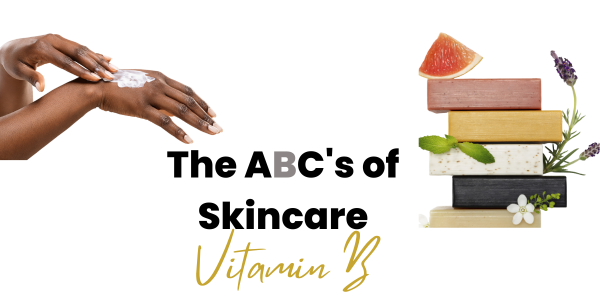
What are Vitamins?
The letter “B” in ABCs will focus on Vitamin B benefits. This is a 3-part series focused on the ABCs of Skincare. This blog post will be the second topic in this series. If you have stumbled across another ABCs of skincare and it is not the first or second post, please go back and begin with “A.”
As many of you already know, vitamins are essential to life. They contribute to good health by regulating metabolism and assisting the biochemical processes that release energy when we digest food. They are considered micronutrients because our body needs them in relatively small amounts. Macronutrients are carbohydrates, fats, protein, and WATER that your body needs in larger amounts.
What does Vitamin B do for the body?
As a Nutritionist, I learned that Vitamin B is responsible for maintaining the health of the nerves, skin, eyes, hair, liver, mouth, brain function, and other muscles in the GI tract. There is actually a group of Vitamin B’s that my nutrition book refers to as “B Complex,” but for the sake of not getting technical, we’ll call them “groups.” The wonderful thing about the groups is that they work together. If you have a deficiency in one, you will more than likely be deficient in another. There are eight groups, but we are only focusing on the first three. I’ll share later what some of the other groups do for the skin, but for now…let’s break down these groups.
Group 1: Thiamine
Vitamin B1, or Thiamine, enhances circulation, assists in blood formation, and the production of hydrochloric acid (that’s the acidic stuff that’s in your stomach that breaks food into tiny little nutrients). B1 has a positive effect on energy, growth, normal appetite, learning capacity and is even needed for muscle tone of the intestines, heart, and stomach. Some sources of Thiamine are brown rice, legumes, rice bran, wheat germ, whole grains, broccoli, dried prunes, oatmeal, most nuts, and spirulina.
Group 2: Riboflavin
Vitamin B2, or Riboflavin, is necessary for red blood cell formation, antibody production, and growth. It alleviates eye fatigue and is important in preventing and treating cataracts. Vitamin B2 also facilitates the use of oxygen by the tissues of the skin, nails, and hair. Fun Fact: Together with Vitamin A, it maintains and improves mucous membranes in the digestive tract. Some sources of Riboflavin are cheese, egg yolks, fish, meat, legumes, poultry, meat, spinach, whole grains, and yogurt.
Group 3: Niacin, Nicotinic Acid, Niacinamide
Now listen, if you’ve gotten to this part, you are doing well. This is my favorite group. As you see, this particular vitamin has different forms. We are not going to dive into each and every form, but know that Vitamin B3, or Niacin, is needed for proper circulation and healthy skin. Some sources of Niacin are enriched grains, beef, chicken, turkey, mushrooms, wheat bran, tuna, asparagus, and peanuts.
What can Vitamin B do for the skin?
Our friend, the Vitamin B Complex, is exactly what the word says, “complex.” Here is where I will break down all 8 B vitamins, not in-depth, but where you will be able to understand their function. Going in order, the first up is B1.
- B1 (Thiamine)-is good for red, irritated, acne-prone, or dry skin. It improves the appearance of fine lines and wrinkles.
- B2 (Riboflavin)- This can help improve skin tone, make the skin more radiant, and balance natural oils, which is great for those with acne-prone or dry skin.
- B3 (Nicotinic acid or Niacinimide)- supports your skin’s natural defenses by improving the look of large pores, fine lines, and dullness. It helps protect against environmental stressors and can improve the look and feel of mature, dry, and sensitive skin.
- B5 (Pantothenic acid)-Great for those who struggle with dry skin, dullness, or loss of elasticity. It keeps the skin feeling hydrated and supple. It also helps to balance the skin and calms the appearance of redness and/or inflammation.
- B6 (Pyridoxine)-This vitamin helps diminish the effects of hormonal imbalance, which can lead to acne breakouts.
- B7 (Biotin)- Biotin gives your skin a revitalized appearance making it a staple for those with dull and aging skin.
- B9 (Folic Acid or Folate)-It increases your skin’s hydration and reduces the signs of premature aging by maintaining adequate collagen production.
- B12 (Cobalamin)-It boosts the radiance of dull and mature skin, helps to diminish dark spots and uneven skin tone





